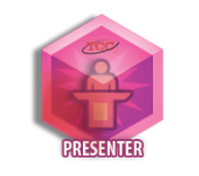- Home
- Articles
- Reviews
- About
- Who we are
- Write for us
- Contact us
About
- Archives
- Past Issues
- The eLearn Blog
Archives
| To leave a comment you must sign in. Please log in or create an ACM Account. Forgot your username or password? |
|
Create an ACM Account |

The 18th Annual Technology, Colleges, and Communities (TCC) Worldwide Online Conference took place last month presenting a diverse program of concurrent sessions, keynotes, and regional presentations to a virtual audience. One of the advantages of an online event is, as Lyn Ackerman noted while introducing a session about GamesMOOC, "the world is here."
According to Credly, the group that generated digital learning badges for the conference, "1000+ participants joined 200 presenters" at TCC. And the daily conference email noted participants were joining in from across the United States, as well as from "Greece, Saudi Arabia, Australia, New Zealand, Portugal, Canada, Israel, Japan, Hong Kong, Korea, and other locations."This conference is "attended by university and college personnel including faculty, academic support staff, counselors, student services personnel, students, and administrators." While there is a focus on helping novices explore the possibilities of educational and instructional technologies, the practical sessions related to teaching and learning were applicable to a range of learning professionals and environments.
Another benefit of participating in an online professional development activity is the learning that takes place beyond the session topics. As participants navigated the multi-platform virtual venue, there was an opportunity to experience BadgeStack, which was the designated conference portal. Here you could find asynchronous discussion forums, as well as Blackboard Collaborate and Adobe Connect for live sessions, which were also recorded. There were even opportunities to join a presentation in Second Life, and follow an active Twitter backchannel using the event hashtag: #2013tcc.
The theme of this year's conference was "Emerging Technologies in Education: Trends and Issues" and the sessions reflected this through the presentation of not only specific tools, but also a variety of approaches. Some messages were heard across sessions, including:
While the fees for this kind of event are generally much lower than traditional conferences, TCC also makes a portion of its program open to anyone. A pre-conference session and three regional presentations, taking place live across time zones, were accessible via URL.
The University of Hawaii at Manoa's Educational Technology program helps to organize the event, and its master's degree students are included in the program presenting their final projects to conference attendees. This is a great opportunity to immerse graduate students in global professional conference participation, and it also allows them to disseminate their work to a broad audience.
One of the challenges of an online conference can be replicating the professional networking that happens between sessions, in the expo hall, etc. in a face-to-face venue. TCC's organizers created several opportunities to meet and interact with other attendees, including the inclusions of a Mozilla-compatible open badge system, BadgeStack, which recognized participation in the various forums and activities.
Each presenter and participant was also able to create a profile in BadgeStack that included photos, updates, journals, and more. Participants could "friend" each other in the system and there were live "happy hour" events to encourage introductions and exchange in real-time.
Overall the TCC Online Conference is a valuable professional development and networking option that is budget friendly and requires no travel. Additionally, TCC provides an effective model for groups, small and large, that may be considering virtual meetings, conferences, symposiums, or showcases. If you are interested in learning more about educational technology or sharing your work in the field, consider adding TCC to your plan for 2014.
For more information about this year's conference, and for updates about coming events, connect with TCC via Twitter, Facebook, and the conference blog.Melissa A. Venable is an instructional designer with experience in industry and higher education (public, private, and for-profit). She is an education writer for OnlineCollege.org's Inside Online Learning blog, where she also hosts a weekly Twitter chat. Venable's background includes supporting students with career and academic advising. She earned her doctorate in curriculum and design - instructional technology at the University of South Florida focusing on the online delivery of career services. She also works as an adjunct online instructor and can be found on Twitter @Melissa_Venable.
© 2013 ACM 1535-394X/13/05 $15.00
DOI: 10.1145/2483758.2483759
|
To leave a comment you must sign in. |
|
Create an ACM Account. |